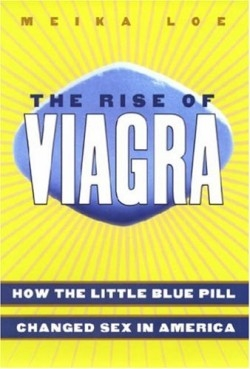The Rise of Viagra
How the Little Blue Pill Changed Sex in America
“Five years ago, when I began this project, I never imagined how much one could learn about one’s culture from a pill.” Professor Loe, who teaches sociology and women’s studies at Colgate, began her documentary in 1998, when Viagra appeared on the market. She takes the Viagra phenomenon very seriously, but includes touches of humor. “In nursing homes, Viagra keeps men from rolling out of bed… Viagra is now being compared to Disneyland: a one-hour wait for a two-minute ride.” This is a scholarly but very human story of the origins and consequences of the first blockbuster sex drug. The author attended medical meetings and marketing symposia, met doctors, patients, pharmacists, and critics, including a group of articulate older women, concluding that “sex and medicine and health and aging in America will never be the same again.”
The book focuses on the history of Viagra, the definition and selling of erectile dysfunction (ED) as a treatable physical ailment, the search for a female Viagra, and the trend toward pills for everything. Using questionnaire data, the Pfizer company asserts that one-third of American men over forty (some thirty million) suffer from ED. The cited results include men who reported mild ED, hardly a medical concern. Senator Bob Dole, after prostate surgery, became the poster boy for Viagra, though it is least effective in such cases. Although it is not promoted as a drug for sexual enhancement (aphrodisiac), recent Viagra commercials involve younger men and athletes. Men in their twenties use it for reassurance, or as a party drug, sometimes mixing it with ecstasy and/or cocaine. Promoters of Viagra don’t mention that forty percent of men in one study reported improved sexual function from a placebo!
What about psychological and relationship factors? Some older women told Loe that they want a respite from sex, not more of it. Her sample was small, but she quotes a mail survey by “Dear Abby” who reported a statistical tie: about 114,000 on each side of the question of whether men on Viagra are a blessing or a curse. Pfizer encourages men to ask their doctors for free samples; rare is the doctor who will take a sexual and social history. This is potentially harmful, given that much ED is transient, and a function of the psyche and/or the current relationship. Doctors work under conditions that favor prescribing rather than talking about embarrassing subjects. Pharmaceutical makers win, with facile prescriptions (over 100 million already) for mostly healthy people, while research on debilitating diseases goes begging because no one gets rich from a drug, say, for muscular dystrophy. Robotic erections are not flattering to many women, and can make a relationship worse while covering up the source of the dysfunction. J. W. Goethe, in The Diary, (1814) tells of a married traveler who seduces a pretty chambermaid and loses his erection; “‘The illness is the real proof of health’ sums up the moral of the poem, i.e., failure to perform merits praise under the circumstances.”
Loe acknowledges benefits for some men and women, but cites many concerns: this is a lifestyle drug that mechanizes the sexual experience, favors the healthy and wealthy, treats all women the same, and blurs the line between science and marketing. The pill distracts attention from social, emotional, and philosophical concerns about identity, prejudice, aging, and relationships. A physician argues, ?“here’s no such thing as a frigid woman, just an incompetent man.” Most men, doctors and drug companies don’t want to confront that degree of complexity. Now a group espousing “The New View” of female sexual dysfunction (FSD-Alert.org) is challenging the standard of sexual response set by advocates of Viagra, Cialis and Levitra. Ironically, performance anxiety (and ED) may be on the rise because all erection failures are defined as medical problems.
Henry Miller, no prude, anticipated the Viagra era in Tropic of Cancer (1934):
“Oh, you,” says Bessie. “You’re just a worn-out satyr. You don’t know the meaning of passion. When you get an erection you think you’re passionate.”
Meika Loe, no prude either, has launched a sober inquiry about a drug that has intoxicated much of America. It could not be more thought-provoking, or more timely.
Reviewed by
E. James Lieberman
Disclosure: This article is not an endorsement, but a review. The publisher of this book provided free copies of the book to have their book reviewed by a professional reviewer. No fee was paid by the publisher for this review. Foreword Reviews only recommends books that we love. Foreword Magazine, Inc. is disclosing this in accordance with the Federal Trade Commission’s 16 CFR, Part 255.

